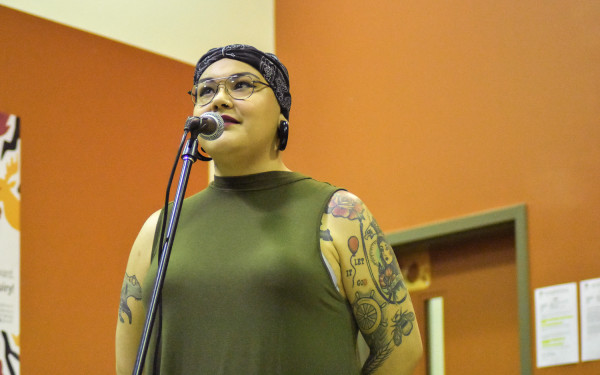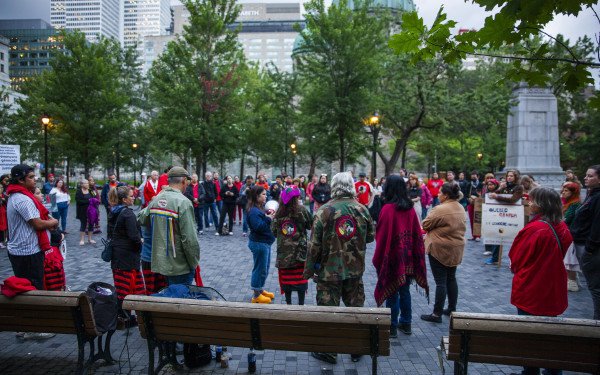Hundreds Brave the Rain for 12th Annual Vigil for Missing and Murdered Indigenous Women
Guests Share Personal Stories, Suggest Improvements to National Inquiry
The night was punctuated by a torrential downpour and the drums of The Buffalo Hat Singers.
The injustices harming Indigenous women is what brought hundreds out. They gathered to bring a voice to the voiceless, remembering those they have lost and to honour their “stolen sisters.”
This took place at the 12th Annual Vigil for Missing & Murdered Indigenous Women on the evening of Oct. 4, at Place Émilie-Gamelin. It was organized by Missing Justice and the Centre for Gender Advocacy, in collaboration with the Quebec Native Women Inc.
In such a public gathering, some had the courage to share their deepest feelings and personal stories.
24-year-old Tiffany Morrisson from Kahnawake went missing in June, 2006. She was found murdered four years later, in the wooded area next to the Mercier Bridge. Morrisson was last seen getting into a taxi in LaSalle.
Her sister, Melanie, told her story to the crowd.
“She was my sister, she was my mother’s daughter,” Melanie said. “She was like a sister to my daughter, they grew up together, my youngest never got the chance to know her.”
Tiffany also had a four-year-old daughter of her own, a daughter who had to grow up without her mother.
“She lay there for four years by herself, her life taken,” Melanie said. “This is what you need to remember. You need to remember this was a human being. This isn’t a statistic.”
“My sister’s file is active,” Melanie said. “Not many people know that because not many people ask. They just figure because she was found, there’s closure, it’s done. It’s not done. […] So please remember Tiffany Morrisson. Her family is close by. They suffer everyday.”
3_900_1259_90.jpg)
In an interview, Melanie explained that she feels family members of the missing and murdered women are often exposed to more negative media coverage of the National Inquiry into Missing and Murdered Indigenous Women and Girls, than they are to positive coverage. This deters them from seeking help. They’re afraid that their voices won’t be heard, or that they will have to relive trauma, but Melanie explained that she doesn’t find this to always be the case.
“It’s a way that some families have started their healing,” Melanie said. “It needs to be more well-known that there are other options and there are other ways to participate. And it’s not just the families that have a missing or loved one that was murdered, it’s also for the people who were victims of violence.”
Melanie’s been involved since 2014 when the first report by Amnesty called The Stolen Sisters came out, and was part of the family working group that helped advocate for the creation of the inquiry. While she went in feeling skeptical, she grew hopeful when she met some of the commissioners, and ultimately it helped her heal. She feels they need to find ways to communicate with the families and with the public at large in a faster and more efficient manner.
Melanie added that police may not be willing to re-open all files. However, if the families feel they were not investigated to the fullest, she said they should know that they have the right to fight for their files to be re-opened. Recently, it was the case when police took a second look at their investigation of Siasi Tullaugak’s death.
“There has been progress from when I started,” she said. “There was no media, they didn’t want to be involved in our stories, there was no general interest because it was just a ‘native issue.’ You can see from tonight, there’s a lot of people that are coming and want to know more so there has been progress.”
Kanien’kehá:ka activist Ellen Gabriel came to the vigil with a different view. She emphasized Prime Minister Justin Trudeau’s hypocrisy. According to Gabriel, Trudeau is giving the impression that Canada is a country where human rights matter, but hasn’t done anything to protect the rights of Indigenous people.
“This is a human rights issue,” Gabriel said. “It’s not an issue for governments to take hold of and to own, […] this is not an issue that belongs to one family but many families. It belongs to nations of people. The nations of people who welcomed the colonisers here, taught them how to survive on this land and what we were gifted with was genocide. The results that we are seeing today, here in 2017, is the result of genocide.”
“This is a human rights issue. It’s not an issue for governments to take hold of and to own, […] this is not an issue that belongs to one family but many families. It belongs to nations of people.” — Ellen Gabriel
She wants to see a more just inquiry, one that puts pressure on authorities and police forces to look into cases of missing and murdered Indigenous women, and one that takes people seriously when they report a loved one is missing.
“Canada does not want a solution to this problem,” Gabriel said. “That’s why you as the people of this country, of this nation, you need to help us. Every woman should be able to walk on these streets safely. Every child should feel safe in their home or in their school.”
She’s seen progress over the years. The first vigil had a modest 20 attendees. Gabriel said she hopes that there will no longer be a need for the vigil in her lifetime. Instead, she would like to see Canada’s education system speak about the issue in all their schools’ curriculums.
Viviane Michel, president of the Quebec Native Women Inc., echoed her concerns. She emphasized that the systemic violence towards Indigenous women has to stop. Michel called on people to write to their members of parliament and of the National Assembly.
“You see to what point the system doesn’t believe us?” she said. “The system doesn’t take us seriously. Whenever it’s an Indigenous woman that has disappeared or been murdered, or that has survived police brutality, it isn’t worth it for them to move a finger. That’s the message that we get.”
Cheryl McDonald’s sister went missing in 1988. She blames her disappearance on the fact that her heart was broken, as her partner had left her for another woman.
“Women, we have to stop hurting one another before we start looking at the man,” McDonald said. “Because we do that in our homes, in our communities, in our nations and it’s gotta stop. We can no longer allow our spirits to be broken and stepped on and trampled.”
She added that she has struggled to find healing all her life, but that it is time that everyone heals.
“We have to heal our own heart,” she said. “That’s the greatest journey we’ll ever take and many of our people are searching for that. I searched for healing all my life. My life isn’t over, and I’ll keep healing all my life.”

1_900_642_90.jpg)
2_900_643_90.jpg)



_600_375_s_c1.png)

